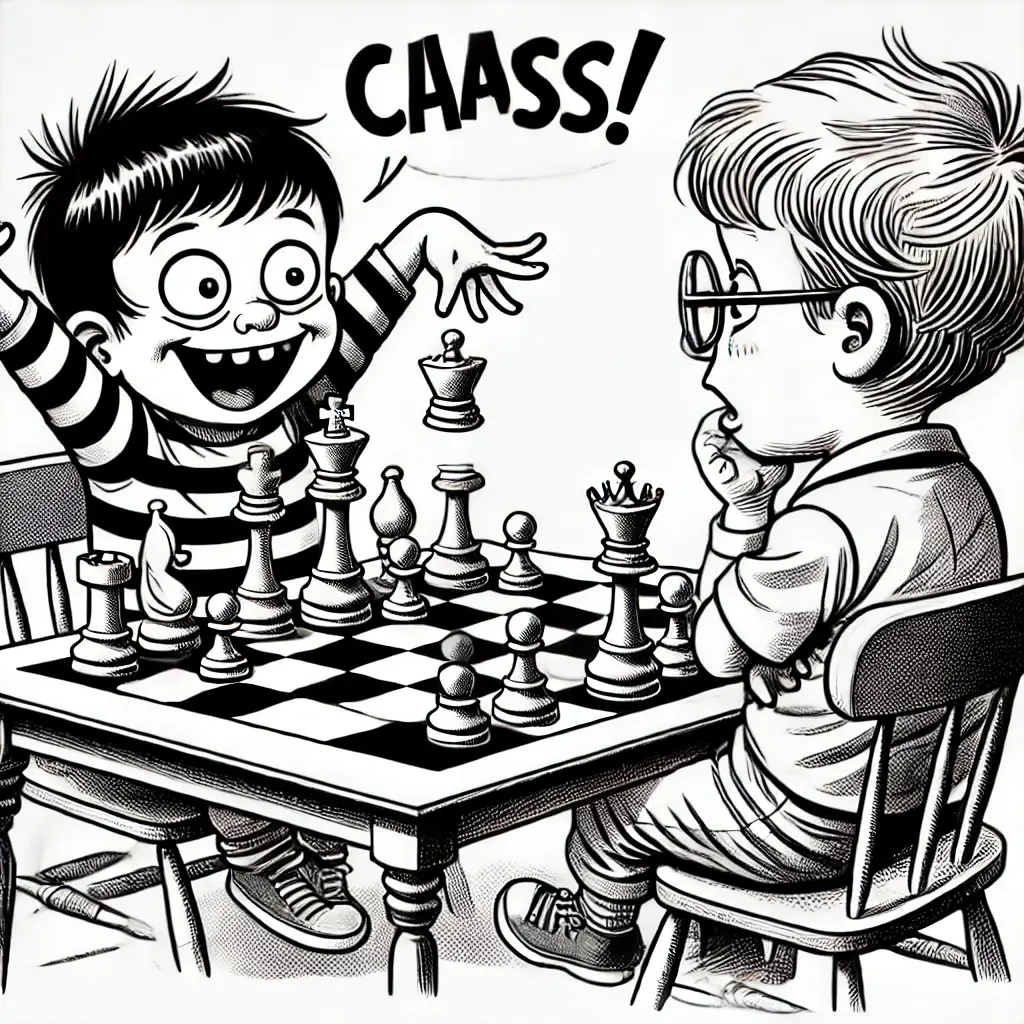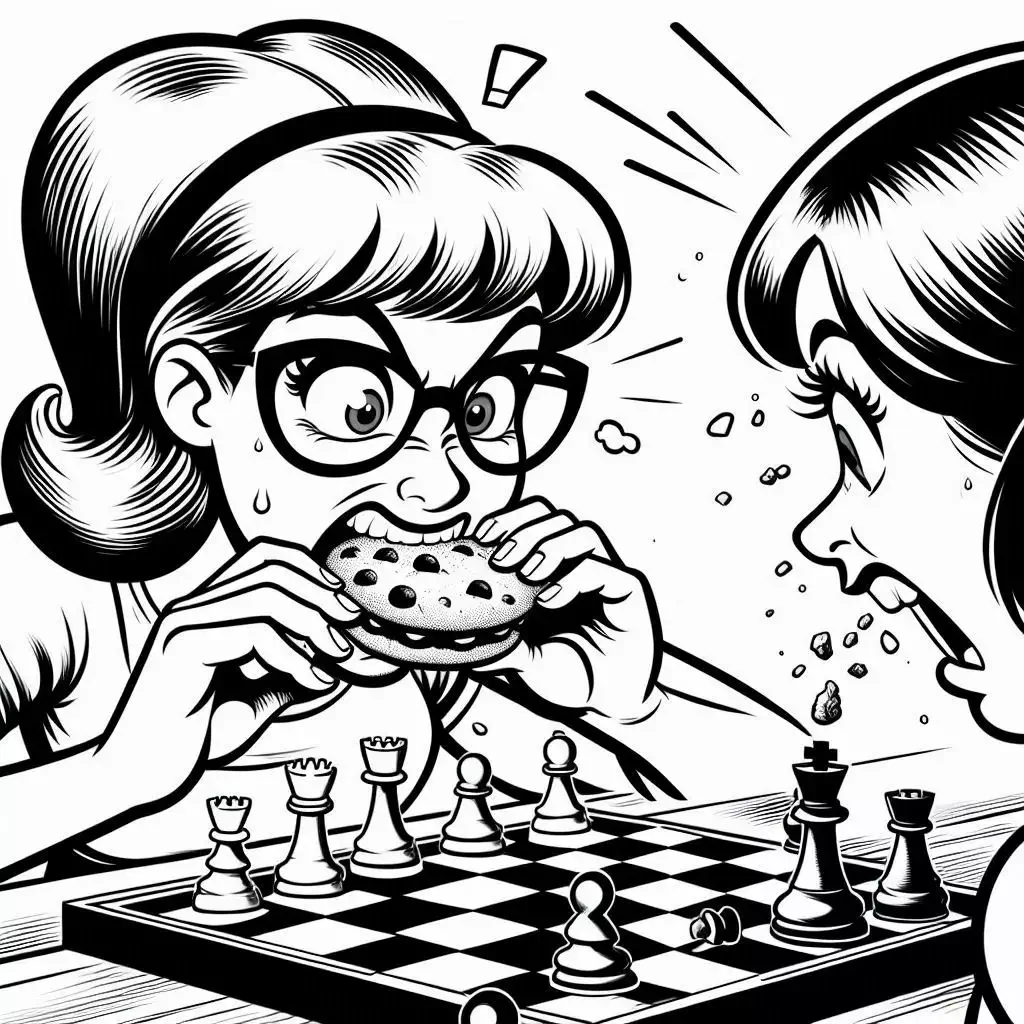22 Beginner Mistakes First-Time Chess Tournament Players Make
If it’s your first competition, pay attention to these common mistakes beginners often make during their first chess tournament.

22 Common Beginner Mistakes in Their First Chess Tournament
Perhaps you’re participating in a chess tournament for the first time and don’t have a coach who has talked to you about basic things, such as not forgetting to press the clock after making a move or recording the moves on the scoresheet. Or maybe you want to reminisce about your first tournament experience and the mistakes you made during it.
Many of these mistakes can lead to penalties or cost you the game. Here we present the typical mistakes that we all make at some point in our first tournament and that should be avoided.
1. Poor Time Management
In our first tournament, many of us struggle with managing time during the game. Often, we overthink our moves or rush to move the pieces. Nervousness or feeling overwhelmed by the environment causes us to lose track of time. You should aim to manage your time wisely, considering all phases of the game: the opening, the middlegame, and the endgame.
2. Overlooking Your Opponent’s Threats
Perhaps you’re someone who loves attacking in chess and wants to unleash your energy on the board, or maybe you’re simply focused on your strategy or feeling nervous. In any case, it’s common on your first tournament day to forget to consider the threats your opponent creates on the board.
3. Mental Paralysis Due to Nervousness or Anxiety
Nervousness and anxiety are perhaps the main problems for many beginners, as they prevent you from focusing on your strategy, your opponent’s tactics, and calculating moves. Before your game begins, try to calm your mind with breathing exercises or meditation.
4. Underestimating or Overestimating Your Opponent
One mistake leads to others. If you underestimate your opponent because their ELO rating is lower than yours, they’re younger, or for any other external reason, you’ll pay dearly by the end of the game. The same happens if you overestimate them and lose confidence in your abilities. Respect your opponent and aim to play solidly or as well as you can in every game of the tournament.
5. Ignoring the “Touch-Move” Rule
If you’ve only played online and attend a tournament without enough practice on a physical board, you might be tempted to touch a piece and then change your mind. But if you touch a piece, you must move it. Some players even touch the king intending to castle, only to realize it’s not legal because the king is in check. In such cases, you must move the king to another legal square.
6. Forgetting to Record Your Moves
It seems simple enough: just arrive, wait for the game to start, and begin playing. But in reality, since you’re so focused on the game or the moves you and your opponent make, you might forget to record the moves on the scoresheet. When you realize you haven’t written anything down, you might end up asking your opponent for the moves played.
7. Forgetting to Press the Clock After a Move
This mistake is also very common in your first tournament. You’ve moved your piece, and now what? You notice your opponent isn’t responding to your move. If you’re lucky, your opponent might remind you to press the clock after making your move. If not, your clock will keep running until you notice it or realize your time has run out. This mistake often happens because many of us play without a clock beforehand.
8. Making Hasty Moves
You analyze your possible moves based on the position on the board, which is great. But sometimes, after analyzing and trying to return to your initial position to make your move, you mix up the analysis, act hastily, and move the wrong piece or in the wrong order. Anxiety takes over, and it’s the source of many critical errors in chess.
9. Offering a Draw Improperly
Did you know there’s a proper way to offer a draw in chess? Generally, you can offer a draw after making your move and before pressing your clock. It’s also allowed at other points in the game, as long as it’s not done to distract or annoy your opponent.

10. Castling Incorrectly
Perhaps you’re used to castling with both hands because no one taught you that the move is made with one hand: first moving the king to its new square, then placing the rook in its new position with the same hand. Moreover, if you touch the rook first instead of the king and your opponent notices, they can call the arbiter, and you’ll be required to move the rook to another square.
11. Unsportsmanlike Conduct
Never, ever display unsportsmanlike behavior in your first chess tournament. This includes making annoying noises like chewing snacks, tapping the board with your piece after capturing an opponent’s piece, distracting your opponent, failing to shake hands, or trying to win off the board. If chess teaches anything, it’s personal integrity and high values.
12. Continuous Distractions
A medium or large tournament often comes with many distractions: people talking, photographers taking pictures of you and other players, players arguing, the noise of chairs moving… It all adds up, making it hard to concentrate and leaving you frustrated by the inconveniences.
But that’s what concentration is about. Your game has to matter more to you than everything happening outside of it. So, before focusing on the noise of chairs, think about the adverse final result of the game if you’re not able to concentrate. Let the referees handle the noise.

13. Losing Composure Due to Your Emotions
This may be one of the least addressed aspects at the competitive level. A lot of time is usually dedicated to the technical analysis of games, but generally, little to no attention is given to the emotions of chess players. When it’s time to participate in your first tournament, external events affect your thoughts and prevent you from performing properly or might even give you a bad image if you can’t control yourself.
You need to learn to become aware of what you’re feeling in different moments or situations. This will help you get to know yourself and give you room to adapt without problems. Meditation exercises can help you if you dedicate time to them. Don’t hesitate to research more on the topic.
14. Forgetting About the Time Increment
This is part of managing your available time. Specifically, we’re referring to knowing in advance how much increment you have so that in critical situations, when time is running out (usually in the endgame), you don’t end up moving your piece too quickly or too slowly.
15. Arriving Late to Your Game
Experienced players tend to arrive late to their games because they already know how to manage their time and have studied their plan. But if it’s your first tournament, arrive before your game starts. This will give you time to begin calmly and mentally prepare yourself.
Many players also arrive late to the game to unsettle you and gain a psychological advantage. Stay calm and don’t pay attention to it.
16. Forgetting the Materials You’ll Need
Not all tournaments provide the necessary materials for all competitors (clock, chessboard, and pieces, pen for recording moves). Check the tournament announcement. It will include instructions about what you need to bring for each game.
17. Being Unfamiliar with Chess Notation
Some players waste a lot of time in their first tournament because they’re not accustomed to recording chess notation. In reality, they were never used to doing it and tend to make mistakes when writing each move on the scoresheet. If there’s a dispute during the game, the correct notation on the scoresheet is the only evidence you have to defend yourself if your opponent tries to take advantage.
Two situations can also occur: after recording a move, you forget to stop your clock, or, conversely, after stopping the clock, you forget to record your move. Choose one of two options: 1) move, stop the clock, and record your move, or 2) move, record your move, and stop the clock. We recommend the first option, as it ensures you don’t lose time while recording your move.
18. Not Knowing the Tournament Format Details
It’s vital to know the rules and procedures of the tournament. If you have a coach or chess teacher, talk to them so that in case an unforeseen situation arises, you know what to do. You need to understand what happens in the event of ties in the standings or if there are any rules different from those published in the FIDE manual.
19. Forgetting to Bring a Snack or Drink for Long Games
In general, bring something light to eat or drink for any game format, especially for classical games, as they demand enough energy to think and stay focused. Your energy can wane, and you could lose the game or the advantage of a good position due to something as simple as mental and physical exhaustion.
20. Not Asking the Referees for Help in Case of Doubts
Referees are there to facilitate the flow of the game in case of disputes or questions related to the game. If you have any doubts, don’t hesitate to clarify them at the appropriate time.
21. Trying to Win Using Chess Tricks or Basic Tricks
If you’ve ever watched those videos on how to checkmate in 3, 5, or X number of moves, it’s better to forget about trying them in a tournament.
While these strategies can be fun to learn and apply them with your friends or family, they’re not always practical in a real tournament setting. Why? For two reasons: 1) because surely others have already seen the same video, and your opponent could counter effectively; 2) because you need to learn to play sportsmanlike and treat your opponent with respect. If you play well, you’ll simply have positive results most of the time.
Remember, success in chess comes from understanding the game, not from shortcuts.
22. Not Analyzing or Reflecting on Your Losses
Victories fill us with joy, but learning from our defeats helps us improve and avoid losing in the same way again. Don’t throw away your scoresheet out of disappointment; instead, analyze your game once the bitter taste of defeat has passed and become stronger.
If you’ve read this far, you’ll be better prepared to know what to keep in mind for your first chess tournament. Good luck and much success!